What are libraries for? What impact do they have within their communities? And how can libraries use and improve this impact to inform new business models, which will help them to be financially sustainable? Continue reading
VHOST is deprecated. Use the boolean constant SUBDOMAIN_INSTALL in wp-config.php to enable a subdomain configuration. Use is_subdomain_install() to check whether a subdomain configuration is enabled. in /var/www/html/wp-includes/functions.php on line 5497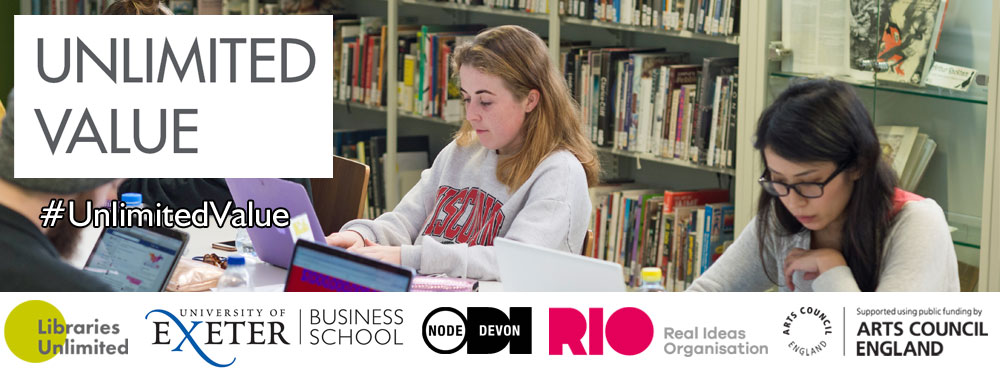
What are libraries for? What impact do they have within their communities? And how can libraries use and improve this impact to inform new business models, which will help them to be financially sustainable? Continue reading
Our Literature Review on evaluating the social value of libraries has arrived!
As new Prime Minster Boris Johnson recently said, libraries are part of the ‘vital social and cultural infrastructure‘ that makes our communities vibrant places to live and work. But how can libraries learn to evaluate this important but hard-to-measure impact in all its diversity and richness? Download our report to find out what the academic literature reveals on the means by which libraries in the UK and elsewhere are choosing to assess and evidence their ‘social value’.
[download id=”410″]

Action Learning has underpinned the success of the Unlimited Value research project. The Arts Council England funding has enabled us to develop a toolkit which can help your organization embed and benefit from the principles of Action Learning.
You can download this toolkit here: [download id=”396″]
This short and practical guide will be useful for participant, facilitators and line managers. It includes information on:
One of the most successful parts of the Arts Council England funded Unlimited Value project has been the Action Learning inspired leadership development programme that informed our participatory Action Research. Action Learning is an important leadership development tool because it enables participants to tackle live challenges as they arise, and to help one another develop practical solutions and next steps for tricky issues that are often seen as ‘too difficult’.

Our first Social Value Champions, with the research team and Ciara Eastell, then CEO of Libraries Unlimited, at the first Research Summit.
For some, this experience can be truly transformative:
“I do really think it has changed my life, and I think that if more people had the chance to take part in action learning, it’s got the potential to build a very strong organisation…” (Participant, Social Value Champions Programme, 2018).
Together, the University of Exeter Business School and Libraries Unlimited enlisted a team of Social Value Champions, to work on developing a better understanding of Social Value over time. The programme centred on 6 action learning sets of up to 4 hours’ duration each, spread over 9 months. Between meetings, participants also attended research summits, staff conferences, colllaboration days and other training workshops. The sets provided an important data source for the project, showing the researchers how individuals learn to share new ideas and translate learning into action. Equally importantly, they helped Libraries Unlimited to embed, across the organization, a better understanding of how to connect social value to the daily experience of working in frontline library services.
It’s often said that a good action learning challenge begins with ‘How Can I…’? And certainly, at the heart of action learning is an open-ended peer questioning technique that develops practical problem-solving skills. Feedback from participants supports this argument:
‘[I] approach problems a lot more analytically now and I find I open things up to my team a lot more… I’ll invite them to have an input, feed back, say what they think we could do to move things forward. And [Action Learning techniques] really helped me with breaking down what I needed to do [for a major piece of recent work] putting it into a plan and working out who I needed to talk to…’ (Participant, Social Value Champions Programme, 2018).
As the programme progressed, we noticed that the Champions became more confident about their ability to enact change. They moved from focusing on small, individual challenges, towards tackling more challenging and systemic organizational issues. As one participant reflects:
“I have found the open question technique invaluable; absolutely fantastic. It allows me to have challenging conversations in a really collaborative way, it’s enabled me to open up conversations with people that I have previously found difficult. It has given me confidence to have a greater say.” (Participant, Social Value Champions Programme, 2018).
An important legacy of the Unlimited Value project is a greater awareness within libraries sector of the power of Action Learning to develop leaders and change agents at all levels of the organization. Stand by for our free Action Learning Toolkit, based on the process developed through Unlimited Value, to help you create the next generation of leaders.
You might have recently watched Ciara Eastell’s emotive TedEx talk on the power of libraries to transform and empower lives.
[youtube https://www.youtube.com/watch?v=Tvt-lHZBUwU]
In her talk, the former CEO of Libraries Unlimited reveals an important finding from the Unlimited Value research. We argue that libraries are ‘heterotopias’ – places of potential where there is opportunity for transformation. They are places characterised by multiple meanings, which cater to diverse stakeholders with even more diverse needs. As one frontline member of staff put it: ‘A library is a place where people can come to be themselves’. A library is a place of possibility, which ‘opens up’ rather than closes down identities and social categories.
Ciara shows, in her talk, that libraries play a vital role in our social fabric. They support people at the heart of communities and in the margins, work to maximise potential at individual and regional levels, and bring together people who might not otherwise encounter one another. Libraries are ‘both/and’ places – they cater to children and the elderly, they can be a quiet refuge and a host of loud ‘bounce and rhyme’ activities.
The challenge from a ‘social value’ perspective, is with the difficulty of arriving at a single purpose definition associated with heterotopic places. Which can make it difficult to calculate and create a coherent narrative around, the difference a library makes to its service users and surrounding community. But whilst the ‘what’ of social value might vary depending on a library’s location, service users, and so on, perhaps we might arrive more precisely at the ‘how’ – the tools that library services can harness to develop a better understanding of a library’s unique contribution.
You can read more about heterotopias, and about our approach to social value in our project report here: [download id=”381″].
It’s here! We are pleased to announce that our final project report has been published, with a launch coinciding with World Book Day in March 2019. You can download it here: [download id=”381″]
In the report, you’ll find details about the activities and data underpinning the research, our dissemination events and about our new 3-D model for building understanding on social value creation.

We’d like to thank Arts Council England for funding this important piece of work. You can find more useful presentations and toolkits on helping your staff develop more understanding of social value creation here.
New Gender Pay Gap Reporting Regulations come into effect on the 4th April, which means that all British organisations with over 250 employees must disclose information about pay differentials between men and women in their employment. But what does this mean for library services? The Chief Executives of four English library mutuals met on 20th March to discuss the implications of this initiative for their organisations and the wider library sector, and to explore how they might shape discussion within and beyond their organisations on improving pay equality in a profession with high proportions of female and part-time workers.
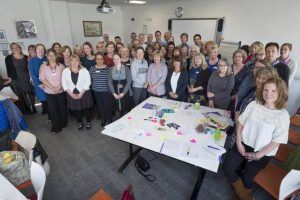
Three of these organisations – Libraries Unlimited, Suffolk Libraries and Inspire: Culture, Learning and Libraries – have published their gender pay gap data this year – relating to the mean and median averages for men and women for pay and bonuses, the proportion of women and men receiving bonuses, and the proportion of men and women occupying each quartile of the service pay structure. For these leaders, this represents not only a learning experience, but an opportunity to lead the sector by offering new insights into how libraries might actively advocate for women’s career progression and increased diversity across the library workforce.
Check out recent progress with the Unlimited Value project in our Interim Project Report available for download below.

Engagement with library data is at the heart of the Unlimited Value project, in helping libraries learn how to maximise social impact by making data driven, informed decisions. But how do libraries learn to use the data they possess and how can they do this openly and in collaboration with other stakeholders? ODI Devon is taking a leading role in helping the other Unlimited Value partners develop a stakeholder-led, collaborative and open approach to managing and acting on their service user data. In this post we explain more about the Open Data Institute and ODI Devon, and share how these organisations are helping to make pioneering steps in using data to make libraries more relevant, impactful and resilient than ever before.
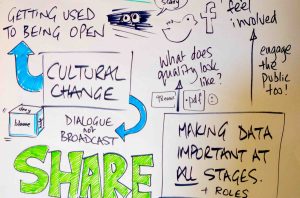
ODI Devon are the local branch (or “Node”) of the Open Data Institute, a global organisation based in London and started in 2012 by Sir Nigel Shadbolt and Sir Tim Berners-Lee. Our mission is basically twofold: to increase the quantity and quality of open data released by organisations in Devon, and to help everyone – from individuals to organisations – to use, combine, re-use, and re-publish the data for public benefit.
If you aren’t following the movement closely, it might surprise you to know that the UK public sector has now published over 40,000 datasets (and that’s just the ones catalogued on the central open data portal for the UK, data.gov.uk). This data is used for many different purposes, for example:
– better regulation of peer-to-peer lending in the UK
– Analysing the effects of a decision to close some London fire stations
– Developing apps that help people get around the capital
– Use of LIDAR datasets for Town planning, flood risk analysis, archaeology and game world generation.
The Devon Node of the ODI has been going since 2014 and is a collaboration between the public and private sectors: it has spawned a number of different side projects such as ThingsCamp (a semi-regular gathering for people who want to learn about the Internet of Things) and The Data Place (a Plymouth-based social enterprise dedicated to building low-cost accessible data infrastructure). Mainly though, the Node is here to support different open data initiatives in the region and we regularly attend local Meetups and support initiatives like DataPlay – Plymouth City Council’s open data engagement programme.
When our hugely successful local Libraries social enterprise approached us to collaborate on maximising their social impact, we obviously jumped at the chance. In a way, Libraries are the original open data organisations: everything they do is dedicated to opening up knowledge for everyone and Devon is very lucky to be home to Libraries Unlimited – one of the most forward-thinking library services operating in the world today.
We saw an opportunity to work with an organisation that had a proper county-wide footprint and was engaging regularly with the public: these things are important if segments of the county aren’t going to be left behind.
At the same time, we are realising that the impact of public services is something that is poorly understood in many fields. As public sector budgets get ever tighter, we realise that it is increasingly important to know what is making a difference in communities so spending can be better targeted. We think (unsurprisingly) that open data holds part of the solution to this situation, because calculating impact is not helpful unless it can be done in the open.
We are engaging with this project in two phases: discovery and design. Earlier this year we ran a discovery workshop at Exeter library where people involved or interested in the library service carried out a giant “brain dump” of all the data that the service creates or impacts on. You can see some of the results of that exercise here.
We’re now collecting some of that data together in preparation for a prototyping event in early 2018, where people will get the chance to imagine some of the things we might do with that data and make prototypes in a variety of ways.
Alongside all of this we are working with the libraries service to create a data portal that shows all the data relevant to the social and economic impact of the libraries in Devon: a full release of this will coincide with the completion of the rollout of a new stock management system by the Libraries Unlimited service.
Leaders from a diverse range of sectors came together at “Leading practice in unlimited value creation”, an Action Research Summit at the University of Exeter last week, to discuss how library services and other social enterprises and charities can better understand their social impact, and use it to ensure financial sustainability.
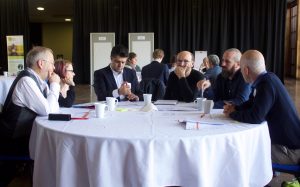
The summit was hosted by the University of Exeter Business School as part of the two-year “Unlimited Value” research project led by the University of Exeter in partnership with Libraries Unlimited, Open Data Institute (ODI) Devon and the Real Ideas Organisation (RIO), and funded by Arts Council England.
This was the first in a series of events that aim to better measure and understand the impact of libraries on their local communities. In doing so, it is hoped that Libraries Unlimited will be able to identify new partnerships and opportunities that will help to ensure its sustainability.
The summit brought together academics, policy makers and senior practitioners from a diverse range of backgrounds, with speakers including Deputy Vice Chancellor Professor Tim Quine, Professor William Harvey, Co-Director of the Exeter Centre for Leadership, Jennifer Wallace, Head of Policy at Carnegie UK Trust, Dr Beverley Hawkins, Senior Lecturer in Leadership/Organisation Studies and Director of Education at the University of Exeter, Matt Little, Co-founder and Head of Impact and Research at RIO and John Knell, Director of Culture Counts.
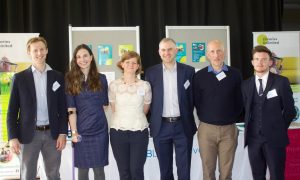
Guests also heard from Libraries Unlimited Chief Executive Ciara Eastell and a number of Libraries Unlimited employees who have been involved in Action Learning Sets as part of the research project.
The Action Learning Sets are designed to encourage staff to explore and learn from their own work challenges, develop leadership skills and use their ideas and experiences to help shape the future of the organisation.
During the day, delegates discussed the challenges and opportunities faced by charities, social enterprises and cultural organisations to diversify and innovate their services to meet the needs of communities, whilst remaining financially sustainable.
Round table discussions saw colleagues from the Citizens Advice Bureau, Libraries Taskforce, Mutual Ventures, Gloucestershire County Council, Exeter CVS, the Wellcome Trust, the British Library and the Royal Society of Arts openly discuss the challenges faced by those going through organisational changes and how they can understand, grow and showcase the value they create within their communities.
Ciara Eastell, Chief Executive of Libraries Unlimited, the charity responsible for running Devon’s public library service, said: “Our first Unlimited Value Action Research Summit was a really stimulating day.
“By bringing together such a diverse range of people it opened up a new kind of conversation and provoked valuable debate.
“It was fascinating to hear from colleagues from a range of different sectors who were open and honest about their own challenges, many of which were not dissimilar to our own.”
She continued: “Over the past few years, the library sector has had to adapt significantly, not least because of the changing needs of the communities we serve, but also because of the changing political and economic landscape.
“These factors affect a range of organisations, and this research will consider the ways that we and other organisations can continue to deliver valuable work, whilst ensuring we have reliable sources of funding.
“I firmly believe that libraries have an important role to play within communities, and am excited to be part of a project that will help shape the future of our service. Research by Carnegie UK Trust shows that half of all people in each jurisdiction use their library and three quarters of people think that libraries are important community assets.
“Alongside that, we know that community needs are changing, which is why this research project is a crucial first step in understanding how we need to continue to evolve to make sure we are supporting people at all stages of their lives.”
Dr Beverley Hawkins, Lead Researcher for Value Unlimited, explained: “The research summit is a great example of how business schools can work in partnership with organisations to develop innovative practices and shape conversations.
“Our summit has helped create a network of engaged thought leaders keen to shape policy and practice on how organisations might capture and evaluate their social impacts.
“This activity is becoming significant not just for libraries, but for all organisations with social missions – we are excited to be generating meaningful conversations and insights in this area.”
Matt Little, Co-founder of RIO, said: “RIO are one of the leading social enterprises in the South West and it is a real pleasure to be working on this research project with Libraries Unlimited and the university.
“We are all learning a lot from each other and we want this research to make a real impact. These are difficult and challenging times and against this backdrop libraries play such a crucial role in people’s lives and in communities.
“It is vital that we all do all we can to help them thrive and prosper, and social enterprise offers some useful lessons and ways forward, with Libraries Unlimited leading the way here.”
Phil Gibby, Director, South West, Arts Council England, said: “We are proud to support Libraries Unlimited through our strategic funding streams and from April 2018 we will welcome them into our regularly funded body of National Portfolio Organisations.
“By facilitating cross-sector discussion, reflecting on best practice and carrying out research, Libraries Unlimited are enhancing the valuable creative and social offer libraries serve to communities across the country, helping to achieve our mission for more people in more places to experience and be inspired by arts and culture.”
At the heart of the research is a programme that will build the capacity of Libraries Unlimited’s staff to support and develop the potential for libraries to bring people together, offer services that make a difference to communities, and play a role in improving the quality of life and opportunities available to people, all whilst ensuring the financial imperative for the organisation is sustained.
Over the next few months, the project team will work together to analyse feedback and contributions whilst also undertaking research-led teaching projects embedded within curriculum to analyse Libraries Unlimited’s data and information to better understand user trends and behaviours.
As a result, the project team hope to establish new business models and best practice for socially enterprising organisations, helping to demonstrate how the arts and culture sector can make a real difference in people’s lives whilst also operating financially sustainable organisations.
In so doing, it is hoped that Libraries Unlimited will be able to create new partnerships and opportunities that will help to ensure its sustainability as a charity and social enterprise.
For more information about the project visit http://blogs.exeter.ac.uk/unlimitedvalue/ and follow the conversation on Twitter #UnlimitedValue.
Much of my working life has focussed on children and young people, both before and after I helped set up RIO with colleagues. In particular, I am interested in models and practice, in school and out, that build on the potential, interests, latent talent and innate creativity of young people, that gives them responsibility and permits them real, valued and meaningful consequences. Rather than, in contrast, approaching them as either bundles of problems and issues to be resolved, energy to be controlled, or empty vessels to be filled by pre-determined knowledge and then tested based on absorption rate!
In Aarhus I was particularly struck by a workshop delivered by the librarians working with and specialising in services for teenagers at Dokk1.
They had recently carried out a review of their services and spaces for this age group and their conclusions and actions since were very interesting.
The gist of their findings, based on feedback from young people, was that ‘less is more’. And these findings rang true for me.
Teenagers lead such busy and processed lives, full of noise, pressure and expectation. They are changing rapidly, developing different facets every few months. They are under extreme pressure to perform – whether in education or via social media. The world around them is changing dramatically and constantly. They are constantly categorised and judged. They are required to jump hoop after hoop from a very early age. And, as an aside, it is no surprise to me that popular teenage literature strands like Hunger Games and Maze Runner reflect and resonate with many aspects of a performative, divisive, competitive, pressured and judgemental society.
So when these young people are in a library they don’t necessarily want to be facilitated or developed. They don’t always want to be taught or to learn something new, to be compared or judged or awarded a badge or qualification. They want to be left alone to a large extent, in places and spaces where they feel intrinsically comfortable and welcome; to follow their interests in a gentle way, to relate to each other, and for different groups to merge and connect, to enjoy moments of peace, to catch up on work, to more slowly become themselves, or to think, write, revise or read in a free, non-commercial, diverse, quiet and companionable space among peers and fellows.
In terms of social value and libraries, this thinking has interesting implications. First, where on earth else could teenagers be this way than a library? And second, by doing less libraries can sometimes create more! It is not all about agency and activity, and about action leading to impact…